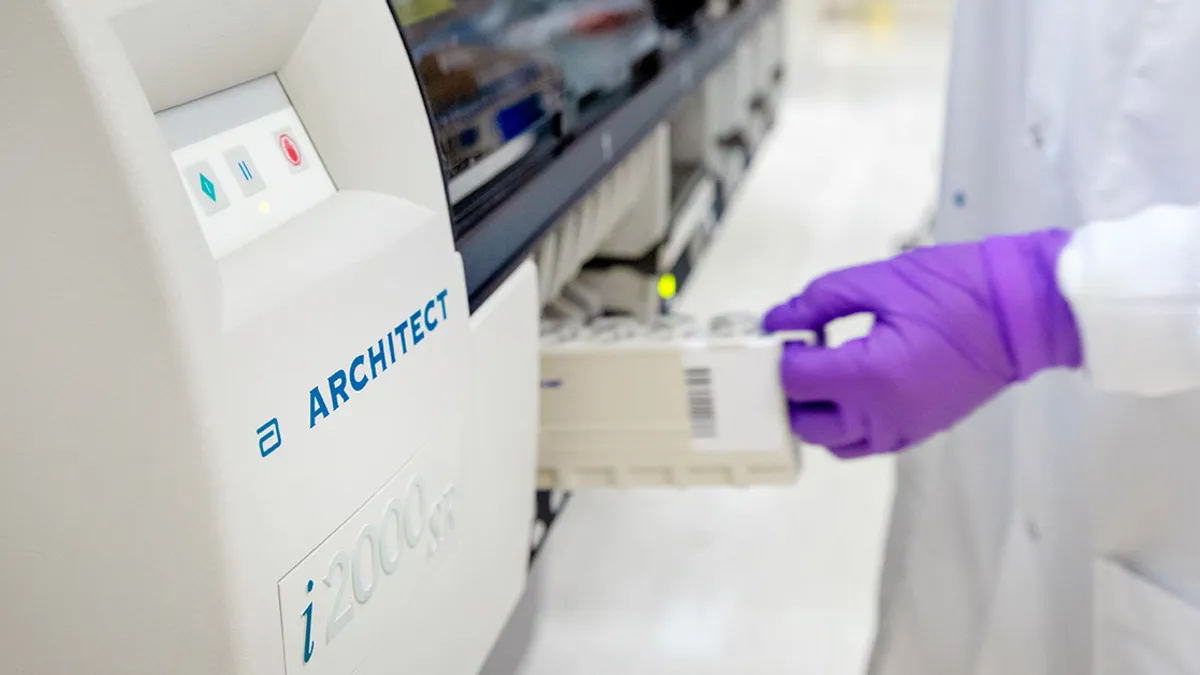Dive Brief:
- Abbott's worldwide COVID-19 testing-related sales reached $881 million in the third quarter, an acceleration from the already dramatic rise to $615 million in the second quarter thanks to new products and increased manufacturing. To date, the company has sold more than 100 million tests across its portfolio.
- While the diagnostics unit handily led the company in positive year-over-year change, the largest unit at Abbott, medical devices, returned to sales growth in the quarter as more elective procedures restarted — up 2.6% organically. Five of the seven device businesses achieved positive growth, but the rhythm management and vascular product lines were weak spots, down on a year-over-year basis.
- Wall Street analysts continued to raise questions on the sustainability of coronavirus testing demand, but CEO Robert Ford argued the company's more important focus is how the recent diagnostics ramp-up accelerates expansion of Abbott's diagnostics footprint outside of hospitals and labs into doctor's offices, universities, airports and retail settings.
Dive Insight:
Abbott's 10.6% organic sales growth reflects the company's unique position to benefit from a COVID-19 testing scale-up and the simultaneous recovery of elective procedures boosting medical device sales.
The medtech's portfolio of coronavirus tests continues to increase in depth and breadth. In the third quarter, the company benefited from the launch of a 15-minute, credit card-sized antigen test, plus the addition of new manufacturing infrastructure in the U.S.
Ford argued that focusing on the trajectory of COVID-19 test demand in the coming year and beyond "misses the point," touting the fact that its pandemic-driven expansion of diagnostic platforms is it making good on the company's vision for decentralized testing when it bought rapid point-of-care testing specialist Alere in 2017.
He pointed to the expansion of ID Now, saying the company had 20,000 of the machines distributed throughout the U.S. at the start of the year and doubled the placement rate over the course of four months.
Taken across the first nine months of 2020, the diagnostics unit is up 15.7%.
Certainly, Abbott's ability to scale its molecular diagnostics business for multiple forms of coronavirus testing business has put the medtech in the spotlight in 2020. But the company's other key growth drivers have continued to progress during the pandemic year, including European authorization for the latest version of MitraClip and the European launch of a sport biosensor version of its FreeStyle Libre glucose monitoring system. Ford called the latter the initial step in a "very intentional approach" to expand the technology beyond diabetes.
Despite medical devices' return to growth in the third quarter, the franchise was down roughly 5% compared to the prior year when considering the first nine months of the year. And the recent flip to positive growth was driven by outsized performance in the diabetes business, Needham analyst Mike Matson pointed out in a note to clients.
Excluding diabetes care, the growth rate for medical devices was negative 3% year over year, "which we believe is more indicative of medical device markets' growth in the quarter," the note said.
How Abbott's medtech sales (in millions of $) have progressed during the year of COVID-19
| MEDICAL DEVICES | Q1 | Q2 | Q3 |
|---|---|---|---|
| Rhythm Management | 474 | 401 | 507 |
| Electrophysiology | 388 | 299 | 441 |
| Heart Failure | 203 | 158 | 190 |
| Vascular | 625 | 481 | 630 |
| Structural Heart | 318 | 223 | 353 |
| Neuromodulation | 177 | 106 | 206 |
| Diabetes Care | 752 | 755 | 843 |
| DIAGNOSTICS | Q1 | Q2 | Q3 |
|---|---|---|---|
| Core Laboratory | 989 | 987 | 1,176 |
| Molecular | 139 | 359 | 458 |
| Point of Care | 138 | 118 | 131 |
| Rapid Diagnostics | 560 | 530 | 875 |
When asked about how Abbott might put the coronavirus testing gains to use, perhaps through reinvesting back into the business or considering M&A, Ford did not go into many specifics.
But some of that benefit will be transferred to shareholders. Abbott raised its earnings guidance for the year to $3.55 per share for the full year. The company did not outline specific revenue growth targets for the fourth quarter or full year.












